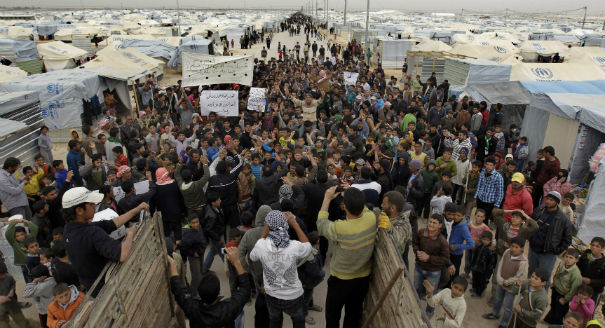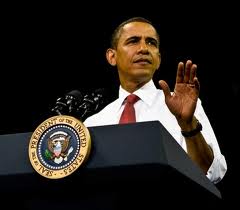
The cost of Syrian refugees
Recent estimates place the total number of Syrian refugees in Jordan at over 500,000. Zaatari refugee camp has become the fourth largest city in Jordan by population—it may not be much of a home, but each refugee costs the Jordanian government 2,500 dinars ($3,750) to host per year. The cost of Syrian refugees is putting a tremendous strain on the economy and is affecting the patronage systems that have ensured tribal loyalty to Jordan’s monarchy in the past. In addition to increasing resentment within the tribal population, the presence of Syrian refugees has also provided a boost in support for the Muslim Brotherhood, Jordan’s best-organized opposition, thereby adding to the tension the Hashemite Kingdom faces.
Jordan’s ability to absorb Syrian refugees has become a growing issue. Its fiscal position has deteriorated since the beginning of the Arab Spring; hosting 500,000 refugees has already cost Jordan over $800 million since the Syrian war began, and unrest across the Arab world, particularly in neighboring Syria, has cost Jordan’s economy as much as $4 billion. Furthermore, foreign assistance, on which Jordan was able to rely while dealing with the influx of Iraqi refugees, is insufficient. Prime Minister Abdullah Ensour recently stated in an interviewthat “the foreign assistance extended to Jordan is not enough in the face of the extraordinary numbers of Syrian refugees who have sought a safe haven in the Kingdom since the start of the Syrian conflict in March 2011.”

Munich’s legacy: historical analogy as a tool in marketing foreign policy
U.S. Secretary of State, John Kerry, made a reference, on two separate occasions, to the Munich Agreement of 1938 as he endeavoured to elicit support for President Barak Obama’s policy in Syria.
During a conference call with Democratic Party members of the House of Representatives on the 2nd of September, Kerry told them that they faced a “Munich moment” as they weighed whether to back President Obama’s call for a limited military strike against Syria.
Speaking in Paris on the 7th of September, during a press conference, Kerry described the situation in Syria as “our Munich moment.”
The Munich Agreement, and the policy of appeasement it represented, is one of the most widely used historical analogies by decision-makers and their advisers in shaping foreign policy, and in selling it to the wider public at home and abroad.
The logic of this comparison runs as follows: a dictator with aggressive intentions has to be stopped, as early as possible, the way the dictators of the 1930s were not. The policy of appeasement that was pursued by Britain and France in the 1930s in order to accommodate those dictators, particularly the German leader, Adolf Hitler, was a failure and millions of people paid with their lives for it.
Following World War II, Munich became a by-word for appeasement, which, in turn, became a by-word for surrender. Just by invoking the term “Munich” both the speaker and his audience knew what was meant by it. Few words in political parlance became so laden with historical connotations as this one did.

Is the Israeli-Palestinian conflict at the core of the recent regional problems?
The notion that a stable Middle East is dependent predominantly on a tiny country like Israel and on its conflict with the Palestinian Arabs being resolved was never particularly convincing. Now, as the so-called Arab Spring has entered its second year, it seems to be less persuasive than ever before.
One has to look at it in terms of cause and effect, inferring logically what would have happened had Israel and the Palestinian Authority reached a final agreement.
Let us assume, for the sake of argument, an agreement between Israel and the Palestinian Authority was reached prior to the emergence of the so-called Arab Spring.
Following such an accord, what would have happened in Syria? Would the cruel civil war now taking place in that country not have occurred? Would the Assad regime have behaved any differently towards those opposing his rule? Would they have conducted themselves any differently towards his regime? Would the Iran-backed-Hezbollah not have intervened directly in that civil war?

The historical roots of Obama’s foreign policy
A common Republican criticism of Barack Obama is that he has been a weak foreign policy president who has little regard for American ideals. Obama ‘has responded with weakness to some of the gravest threats to our national security this country has faced’, charged the 2012 Republican platform. Mitt Romney accused Obama of starting his presidency with ‘an apology tour’. Republican rising star Marco Rubio says Obama wants ‘to make America more like the rest of the world, instead of helping the world become more like America’.
Yet, an examination of the history of US foreign policy and the ideas which influenced it shows that far from being a radical departure from the American norm, Obama’s worldview fits with a historical tradition.
In fact, he sounds much like an early statesman.
Stefan Halper, professor of International Relations at Cambridge and a former adviser to several presidents, argues that US foreign relations have historically been influenced by what he terms ‘Big Ideas.’ Their starting point is the belief in American exceptionalism, the umbrella concept from which all other ideas flow – ranging from the early 19th century Monroe Doctrine to the Bush Doctrine and democracy promotion.

Liberty, Liberalism and Surveillance: a Q&A with Quentin Skinner
One of England’s most distinguished scholars, Quentin Skinner is a leading historian of political thought and an outstanding advocate of a contemporary republican viewpoint. This interview with Richard Marshall of 3:AM sets out an accessible overview of a lifetime of work. We are grateful to 3:AM for letting us republish it as part of Politics and Spires’ Democractic Wealth series. Open Democracy, our series partner, added at the end two additional questions about corporate power, surveillance and freedom. Skinner’s answer with respect to surveillance is a strong, clear statement of how it is a threat to liberty. This is especially relevant to current affairs given the superficiality of official and in particular British media responses to the Snowden revelations published by the Guardian’s Glenn Greenwald about the programmes of total surveillance being attempted by US and UK secret services.
RM: You are known as a leading historian of political history and in particular the formation of ideas around human liberty. One of the key ideas you’ve written about is what you label ‘neo-Roman’ liberty’. This began back in Ancient Rome didn’t it, where freedom was contrasted with slavery, wasn’t it? Can you tell us what its distinctive traits are?
QS: The vision of personal freedom that interests me is articulated most clearly in the Digest of Roman Law, which is why I have wanted to describe its later manifestations as examples of ‘neo-Roman’ liberty. The fundamental distinction drawn at the outset of the Digest is between the liber homo, the free person, and the servus or slave. The law needed to begin with this contrast because law applies only to free persons, not to slaves. So one crucial question was: what makes a slave? The answer given in the legal texts is that a slave is someone who is in potestate, in the power of a master. The contrast is with someone who is sui iuris, able to act in their own right. Long before these argument were summarised in the legal texts, they had been elaborated by a number of Roman moralists and historians, above all Sallust, Livy and Tacitus. These writers were interested in the broader question of what it means to say of individuals – or even of whole bodies of people – that they have been made to live in the manner of slaves. The answer they give is that, if you are subject to the arbitrary will of anyone else, such that you are dependent on their mere goodwill, then you may be said to be living in servitude, however elevated may be your position in society. So, for example, Tacitus speaks of the servitude of the entire senatorial class under the Emperor Tiberius, so wholly subject were they to his lethal caprice.

Egypt: The Middle East’s newest security threat?
Since the fall of President Mubarak, the Sinai has become an area of increasing lawlessness and instability. The region has turned into a base for drug smuggling, weapons smuggling, human trafficking, and a wide array of militant activity. The Sinai’s border with Israel and its proximity to the Suez Canal make it an area of vital strategic importance and its deterioration has the potential to threaten regional stability, the Egyptian-Israeli peace accords, and Cairo’s relations with the West.

Democracy and Foreign Policy Persistence: Why Pakistan’s India strategy under Nawaz Sharif may not see a paradigm shift
Nawaz Sharif, the leader of the Pakistan Muslim League, is back in power. Sworn in as prime minister on June 5th, for the third time since 1990, he has been recognized over the course of his political career as a principal challenger to the military’s supremacy in governing Pakistan. Indeed Mr Sharif’s proactive pursuit of peace with India became the primary reason for his forcible ouster from power by the army in October 1999 and he was subsequently imprisoned and exiled for intruding into what the army considers its exclusive foreign policy domain. But the tide of history has now turned back in his favour and he promises a ‘new chapter’ in the country’s relationship with India. ‘We will start from where we were interrupted in 1999’, he declared as soon as the PML-N won the May 11th elections.
Since his dealings with India precipitated his ouster from power 14 years ago, there is now a heated debate over the prospects of a fast-paced rapprochement with its southern neighbour. Sharif has already pledged to take some bold initiatives: improving trade, energy and transportation links; expediting the Mumbai terror investigations; establishing a commission of enquiry on the Kargil conflict (which had subverted the peace process with India, especially the February 1999 Lahore Declaration); and reigning in non-state actors such as Lashkar-e-Tayba, accused of committing terrorism against India. Indian leadership (from the majority in Congress and the BJP opposition) have wholeheartedly welcomed Mr Sharif’s return to power and his overtures towards India. For now at least, there is visible public optimism in both countries that perhaps the two traditional foes are finally well on their way towards a sustainable course of mutual peace.

The International “Campaign to Stop Killer Robots”: A misguided effort?
Last month, the international “Campaign to Stop Killer Robots” was officially launched in London. The Initiative, backed by groups from ten countries and several international NGOs aims at pre-emptively banning autonomous robots, most importantly autonomous unmanned aerial vehicles (UAVs or “drones”). In the press statement, the initiators claim that “[u]rgent action is needed to pre-emptively ban lethal robot weapons that would be able to select and attack targets without any human intervention”. They call for “an international treaty […] national laws and other measures.” Nobel Peace Laureate Jody Williams argues that “[a]llowing life or death decisions on the battlefield to be made by machines crosses a fundamental moral line and represents an unacceptable application of technology.”









